- Home
- Nicholson Baker
The Anthologist Page 16
The Anthologist Read online
Page 16
The Fenton poem is “The Vapour Trail.” I was going through a pile of old New York Review of Books’s last year and I saw the title and immediately my heart leapt up, because I always want to read a poem about a vapor trail. So I approached it with that kind of high hope. That feeling of maybe this will be the definitive vapor-trail poem. And it was. It was good, and it was sad, and it was exactly, precisely what you wanted a poem about a vapor trail to be. Exactly, precisely what you wanted a poem about anything to be, in fact. It was moving, and it sang, and it had love in it, and it got you. It grabbed at your love-and-fame vitals. I tore out the whole page from the New York Review, and I clamped it to the refrigerator with a magnet.
And yesterday I took it off the refrigerator and I made two copies of it. One I mailed to Nan with a Post-it saying, “This is the poem I mentioned.” And one I mailed to Roz, saying, “This is a good one. Miss you, hope you’re feeling better —P.”
And as I mailed the Fenton poems out I thought: See that? It’s happening. The transformation, the rediscovery, the renewal. It’s happening already. It’s so exciting. It’s all cycling around. Fenton’s been doing it. My little attempts to write poems that rhyme—unnecessary. My whole career— unnecessary. Because this Fenton poem is out. Good for him. Good for good old Jamesie. I thought of writing him a letter, and I thought, Well, you know, then he’ll have to write me a letter, and it’ll be one of those replies where he’ll be compelled to say, “Coming from you, that’s high praise indeed.” Or not—and if he doesn’t say “coming from you” I’ll be hurt-feelinged, so I thought, Forget it. But I also thought: My life has been in vain and yet not in vain because I’ve had the pleasure of seeing the whole movement come full circle. I’ve lived through the thirty-year ascendancy of chaos and tunelessness, and things are moving back now. It was a mistake to suppress rhyme so completely, a mistake to forget about the necessary tapping of the toe, but it was a useful mistake, a beautiful mistake, because it taught us new things. It loosened people up and made other discoveries possible.
I don’t have to say any of that in the introduction, though. The introduction can be quite short. Forty pages? Forget forty pages. How many people read introductions to poetry anthologies, anyway? Hardly anyone. I do, but I’m not normal. It doesn’t actually matter what I say. Short is best. It should just read: “Welcome to this anthology of rhymed poetry by dead and living poets. I hope you find some things here you like. Thanks so much for your attention. And now—on with the show.”
Only Rhyme would of course define me as an anthologist—i.e., as a lost soul who turned in despair to the publishing of other people’s work—like old Oscar Williams. Old Father Oscar. Sure, Williams got a friendly blurb from Dylan Thomas, but everybody knew his warbling days were done. Still, I think I could live with that.
The real problem is that I’ve had to leave known poets out. Some of them are alive and old. A few of them I’ve met and like. They have strophed and sonneted and upheld the traditional ideals. All that’s missing from their work is greatness—the elusive rupasnil. They’re clumsy rhymers. They’re over-enjambers. Their lines are clotted with wrongness of several kinds. They’re following the old rules on paper, but they don’t hear them—they don’t understand the body-logic behind them. Some of them, when they discover that I’ve left them out, will be wounded. And I don’t want to wound them.
If I don’t write the introduction, then the anthology can’t come out, and then the inept but well-meaning recent rhymers won’t have their feelings hurt. Which would be better all around.
Tim called and said that he’d sent Killer Queen off to the publisher.
I WENT OVER to Roz’s apartment with Smacko, because she was going to be taking care of him while I was in Switzerland. She was getting out of her car in the shade of a maple tree. She’d just come back from Red Leaf, a vegetable store out near Exeter. She lowered her head to the grocery bag she held and she breathed in. She said, “Don’t you love the smell of brown paper bags filled with raw vegetables?”
I leaned and smelled inside the bag. “Yes, I like it very much,” I said. Trying to stay on an even keel but feeling a lot of love for her and wanting to lie down on the sidewalk as a result.
She stood, smiling, waiting for me to say something more. I handed her the beads, wrapped droopily in tissue. “Just something I strung for you, don’t open it now.”
She thanked me, and then she tilted her face up and I kissed her quickly, pretend-perfunctorily. “Good luck in Switzerland,” she said.
16
THE ADDRESS of the Tip O’Neill building is 10 Causeway Street. It may be torn down soon, because it is one of the most wonderfully unsightly buildings ever constructed. In the eighties they blew up a grand hotel that had gone seedy, and in its place they built this shrine to Congressman Tip O’Neill. It houses all the federal offices—the office of Social Security, and the Firearms Legitimization Bureau, the Bioshock Informant Management Corps, and the Soy Protein Tax Credit Administration, and the Federal Security Corn Slab Ektachrome Mediocrity Desk, plus another twelve important outposts of American impotence. And it has wireless Internet.
There was a guard dog inside who was leading around a man with a flat-top haircut. The man’s job was to help the dog sniff out suspicious things. I sent my suitcase through the theft detector and emptied my pockets of everything, and they passed the wand over my genitalia, and then the guard said: “Pull your pants legs up, please, so I can see your socks.” So I did. They were Thorlos, and they wicked away foot sweat like nobody’s tomorrow. Roz gave them to me for Christmas two years ago.
There was Plexiglas an inch thick at the passport office on the second floor. A man in a neat blue State Department blazer asked me some polite questions, and then he clipped my papers together with a comically large paper clip and told me to wait till I heard my number. So I waited. An English mother and her four-year-old girl were there, and the girl had a stuffed baby tiger that, when she squeezed it, meowed. “Did you hear that animal noise?” said a woman. Another woman said: “I think it was the tiger.” And the first woman nodded, reassured.
Then my number came up, and a wide man said I would get my passport at three o’clock. So I went up to the sixth floor and bought a tuna sub. The man who sold it to me leaned very close to the keys when he was ringing up my order. His seeing-eye dog sat with very good dog posture behind him on a Polartec blanket. I thanked him and thought the world was an okay place.
Then I went down to the atrium, and I sat and ate the sandwich, looking at a mural of huge blowups of Tip O’Neill smiling with presidents and senators.
After a while I called Roz and told her I was eating a very good submarine sandwich in the Tip O’Neill building and that I’d grown fond of the building and I didn’t want to leave it and fly to Switzerland and give a master class on being a poet or be in a panel discussion on the meters of love, because I had nothing to tell them.
“Just tell them why you like poetry,” Roz said.
“I’m not at all sure I do like poetry,” I said.
“Yes, you do. I know you. You just need some sleep, that’s all.”
I was quiet for a moment, thinking. “Is Todd being helpful and nice?” I asked. Rather maliciously. Todd was the man whom she’d gone out with a few times. He was an ex–software person who now owned an art gallery in Exeter and wore soft expensive corduroy shirts.
“He’s not particularly nice, but he is helpful,” she said.
“Oh,” I said.
I asked her if I should consider having an affair with a poet in Switzerland, assuming I could find a poet to have an affair with. Trying to be carelessly flirtatious, blowing it.
She sounded surprised. “Do you want to?”
“There would be pain and suffering after,” I said. “Probably not. I’m just asking.”
Roz hesitated. She said: “I would say—don’t.”
“Okay,” I said. “Thanks for your advice.”
“You k
now of course that I love you,” she said.
I SHOWED the airport guards my stiff blue passport and they didn’t say, Sir, this document is laughably new—this document didn’t even exist a few hours ago. No, they waved me on. I popped into the airport bookstore, which was clean with blond wood going way up to the ceiling. It was the best airport bookstore I’d ever been in, and I liked it so much that I bought John Ashbery’s latest book of poems, even though I don’t need more books of poetry and can’t afford them. Ashbery’s photo was on the back, and I saw that he was looking older and even a little bit witchlike now with a downturned mouth. He was born in 1927. He has won every poetry prize known to man or beast, and he was part of that whole ultracool inhuman unreal absurdist fluorescent world of the sixties and seventies in New York. Once he’d edited an art magazine, Art News. Even his name is coolly, absurdly, missing one of its Rs.
I knew a little about that art world, or thought I did, in an odd way. One summer when I was fourteen I took care of a cat at a house owned by two gay minimalist painters, Jerry and Sandy. All their walls were flat white, and there were dozens of their paintings up, huge paintings, with silver ovals of metallic paint sprayed from a slight angle, dripping a little bit. The lonely cat roamed this white minimalist house, meowing in a whiskey voice. While she purred beside me, I sat on the minimalist black couch and read copies of Artforum and Art News from the neat pile on the coffee table. I was hoping to find paintings of naked women, and there weren’t as many as you would expect in those magazines because abstraction was confoundedly in vogue. There was an article about a man who cut his palms and the bottoms of his feet with a razor and photographed them healing.
Now I associate people like John Ashbery and Frank O’Hara with this arty cool minimalist house where I catsat. And I’d never really cottoned to Ashbery’s Self-Portrait in a Convex Mirror, the book that won three awards and made him known throughout the free-verse universe. I’d tried to read it a few times and failed. It’s arbitrary. It reads as if it’s written by a cleverly programmed random-phrase generator. It doesn’t sing.
But Ashbery is old now and therefore more likable. And one of his former students once told me that when Ashbery had a few drinks he got quite silly and giggly and sat on the floor. And the new book had beautiful poem titles in a special typeface, and it had a beautiful cover, and the blurbs were spare and piercing, and although the poems themselves weren’t heartbreakers, the book made me think of the sound of someone closing the door of a well-cared-for pale blue Infiniti on a late-summer evening in the gravel overflow parking lot of a beach hotel that had once been painted by Gretchen Dow Simpson.
So I bought the Ashbery and the hell with it.
ROETHKE SAID that a country can really sustain only fifteen poets at a time, which is about right. These are people who are poking and prodding at the language in a very intimate way, and there’s only so much of that poking at any one time that the language can endure. And yet in Switzerland there were masses of them. There were poets from Michigan, and poets from San Francisco, and from Miami, and from Iowa, and from Brooklyn, and from some place in Tennessee, and from Amherst, Massachusetts, and from Brattleboro, Vermont. And there were Canadian poets, and a beautiful woman poet from Piombino, which is a town in Italy, who wore pale green gloves. And there were poets from Trinidad, from Ruritania, Bali, Belgium, Austria, the Czech Republic, all over the place. Most of them spoke English. And they were laughing, and they had their name tags on. Everyone was furtively checking everyone’s name tag, listening for a bell-tinkle of recognition. They were all being international poets in one place. The noise was incredible. Poets jabbering, poets laughing, a few poets looking hollow-eyed and glum. There was something wonderful seeing them in the room together, but also something a little perverse about it, too, like those kinds of chocolate cake that are filled with inner goops of extra chocolate, that have names like chocolate convulsion, chocolate seizure, chocolate climax. Then suddenly word flew through the room like wildfire—Paul Muldoon was there! Paul Muldoon! Paul Muldoon! He was besieged. I ran into him in the hall later near the late-registration table. There was a lithograph of an alpine scene behind his head. He said, “Why don’t you send me some of your new work?” I squared my shoulders and said I would, Paul, thanks.
The gathering was called the Global Word Congress, and the air was so thin at that altitude that you had to stop every so often to catch your breath, and it changed the way you thought after a while. Some of the poets were being paid to be there. Most of them were paying to be there. We all slept in the ski lodges.
On the second day was the panel discussion with Renee Parker Task and two other people on “The Meters of Love.” Renee was brilliant and distant and wise; my enraging blushing tongue-tiedness kicked in early as I knew it would, and I went all silent and shifty. I made an unnatural snort of a laugh when Renee mentioned “the pentameter line.” Then I thought, Pull yourself together, you cairn of burning garbage, you’re not going to get many more chances like this. So I talked about scansion and enjambment and the importance of the invisible rest, and I said that pentameter was really a waltz, and I talked about how some enjambments made Louise Bogan shudder and rightly so, and then something strange came over me and I opened my mouth and out of it came the tune I’d made up for the first stanza of Bogan’s “Roman Fountain.”
Afterward a woman from New York came up and asked me what the name was of the poem about the fountain and I told her. She said, “‘Rush to its rest’ is really nice,” and I nodded, and I thought I’d at least done something good in offering them some Louise Bogan.
THE MASTER CLASS I gave had a rocky moment. I told them to copy poems out, and to start by saying what they actually wanted to say, and to read their drafts aloud in foreign accents, and to clean out their offices, and to make two supporting columns when they packed their books in a box, and I described trying to edit an anthology and how crazy it made me, and I heard myself sounding more or less like a professional poet. Which amazed me.
And then a man of forty or so, with a French accent, asked, “How do you achieve the presence of mind to initiate the writing of a poem?” And something cracked open in me, and I finally stopped hoarding and told them my most useful secret. The only secret that has helped me consistently over all the years that I’ve written. I said, “Well, I’ll tell you how. I ask a simple question. I ask myself: What was the very best moment of your day?” The wonder of it was, I told them, that this one question could lift out from my life exactly what I will want to write a poem about. Something that I hadn’t known was important will leap up and hover there in front of me, saying I am—I am the best moment of the day. I noticed two people were writing down what I was saying. Often, I went on, it’s a moment when you’re waiting for someone, or you’re driving somewhere, or maybe you’re just walking diagonally across a parking lot and you’re admiring the oil stains and the dribbled tar patterns. One time it was when I was driving past a certain house that was screaming with sun-litness on its white clapboards, and then I plunged through tree shadows that splashed and splayed over the windshield. I thought, Ah, of course—I’d forgotten. You, windshield shadows, you are the best moment of the day. “And that’s my secret, such as it is,” I said.
They all looked at me, and I looked at them. I was the teacher. I was the authority. And then I said, “Of course, it hasn’t worked all that well for me. My first book was okay. But you know what Amy Lowell said. She said, ‘Poetry is a young man’s job.’ “ And then I burst into tears.
No wonder they call it bursting. It’s a sudden outflipping of the lips and an explosion of liquid from behind the eyelids. Everything that’s inside is suddenly coming out. It’s really a physical event. You’re literally shaking with sobs. Fortunately it didn’t last too long.
I apologized and sniffed and smeared my fists in my eyes and collected myself. Then I cleared my throat and I said, more formally, “That’s about all I have.” The class broke for bu
ffet supper in the Rimbaud Room.
I STARTED UP a path toward one of the mountain cable-ways. There were hundreds of ideally spaced dandelions on sharply tilting fields, and there was a remote clink of sheep bells, which are similar to cowbells. It seems that sheep farming receives government subsidies in Switzerland so that the clink will continue. And on every path were more wandering poets. You turned a corner and there was another out-of-breath, sweaty, wandering poet. Some had little notebooks, some had cameras, some held a precious paperback. I saw a little red-haired man in a velvet jacket carrying Charles Simic’s poems—the edition with the beautifully empty paper bag on it. I said, “Algernon?” He shook his head. I said, “Oh, sorry.”
I kept climbing, and then I stopped and sat on a bench and looked across a valley at a distant triangular mountain. The mountain was white, because it was covered with snow, and it looked almost flat—perhaps a trick of the rarefied air. I sat and thought about having a crying jag in my own master class, and then I noticed that the mountain was doing something unusual: it was reflecting quite a lot of white light toward the shadowy mountain that we poets were on. It sent its sideways light deep into the underbranches of the woods, and it made the sedums grow there with unnatural vigor. The sedums were growing in reflected Swiss mountain snowlight. And that was the best moment of the day.

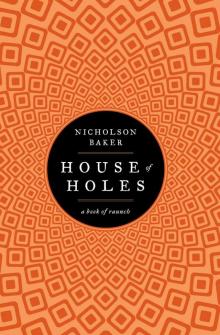 House of Holes
House of Holes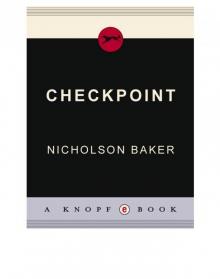 Checkpoint
Checkpoint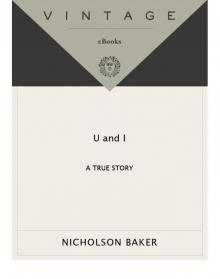 U and I
U and I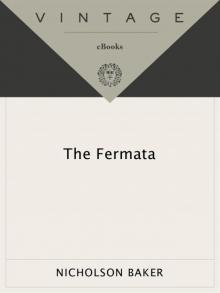 The Fermata
The Fermata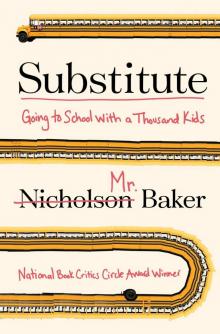 Substitute
Substitute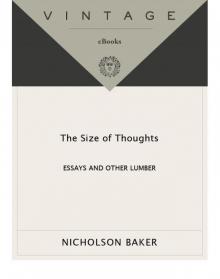 The Size of Thoughts
The Size of Thoughts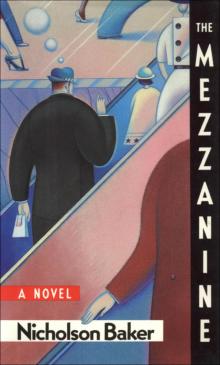 Mezzanine
Mezzanine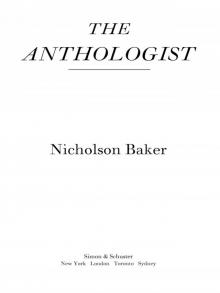 The Anthologist
The Anthologist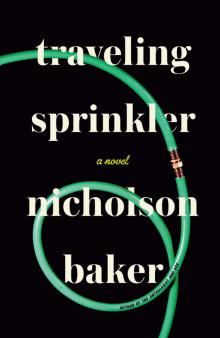 Traveling Sprinkler
Traveling Sprinkler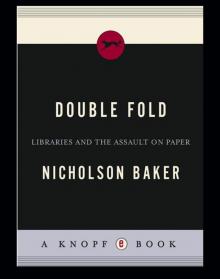 Double Fold
Double Fold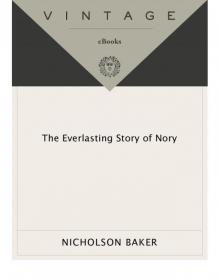 The Everlasting Story of Nory
The Everlasting Story of Nory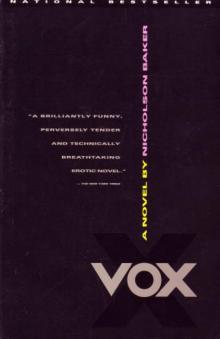 Vox
Vox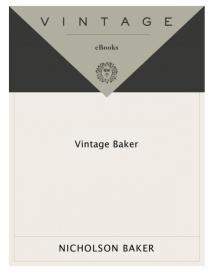 Vintage Baker
Vintage Baker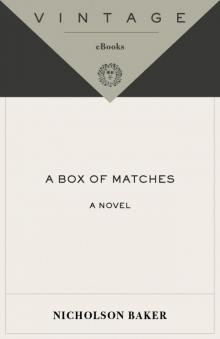 A Box of Matches
A Box of Matches